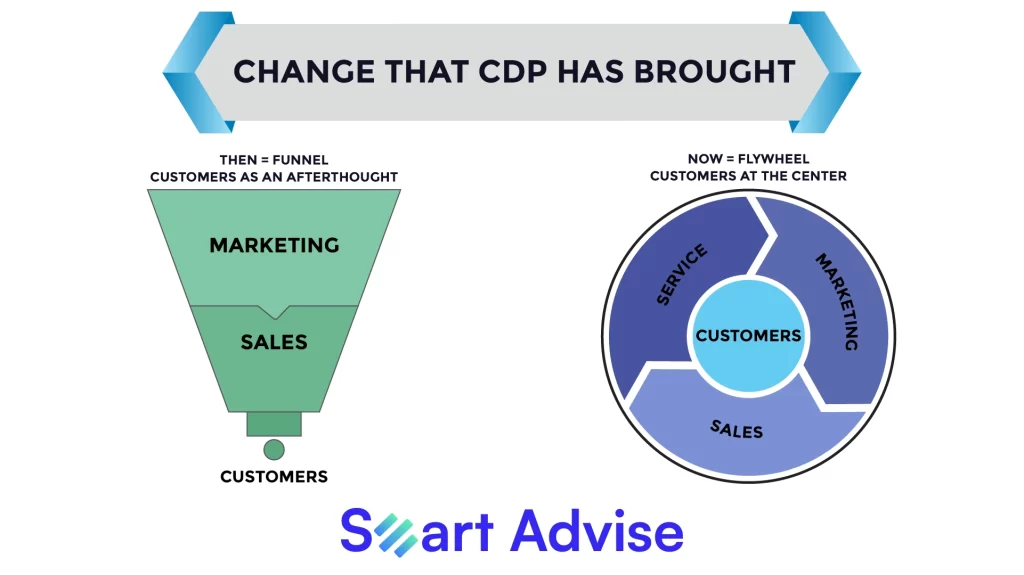
A hazard-free data management system secures your place in the market as reliable brand, and to make it happen, CDP is the most crucial part
Is it enough to gather consumer data to operate to the best of its ability? Marketers often find themselves in this limbo of overdrive data and optimize it in well-mannered form, to used it at its full potential Customer Data platform was made. This solved many of the hazards for marketers like Data Fragmentation, Ineffective Targeting, Data Privacy and Compliance, Time-Consuming Data Management, and all its results as Inaccurate Decision-Making.
What is a Customer Data Platform (CDP)?
Before knowing the benefits, let’s understand what a Customer Data Platform is. A CDP is a centralized hub that collects, integrates, and manages customer data from various sources, including websites, social media, email interactions, and more. It provides a unified, 360-degree view of each customer, enabling businesses to deliver highly personalized experiences and drive data-driven decisions. Now, let’s explore the advantages of implementing a CDP.

1. Clear Customer Insights
One of the primary benefits of a CDP is the ability to gain deep and actionable insights into your customers. Through consolidating data from multiple sources, a CDP creates a comprehensive customer profile, which includes demographics, purchase history, browsing behavior, and more. This comprehensive view enables businesses to understand their customers on a granular level, helping them tailor marketing efforts, product recommendations, and customer service interactions.
According to Data Ideology, Companies that use data are 23 times more likely to get new customers, 6 times more likely to keep old customers, and 19 times more likely to make money.
2. Improved Marketing Campaigns
The power of a CDP lies in its ability to segment and target customers effectively. With the insights derived from the unified data, businesses can create highly targeted marketing campaigns. This means placing the right word to the right person, at the right time. According to Forbes, In the year following their personalization efforts, 95% of businesses who experienced a return on investment of three times or more reported higher profits.
3. Real-time Data Accessibility
In today’s fast-paced digital environment, businesses need real-time data access to stay competitive. A CDP can provide this, ensuring that you have the most up-to-date information on customer behavior.
Real-time data is invaluable for making quick decisions, addressing customer issues promptly, and seizing time-sensitive opportunities.
4. Streamlined Data Management
Data is a valuable asset, but it can also be challenging to manage. CDPs simplify data management by automating data collection and integration processes. This reduces the manual effort required to handle data and minimizes the risk of errors and inconsistencies. A study by McKinsey found that businesses who optimize data management processes can increase their operational efficiency and profitability by 5 – 6 % higher than those of their peers.
5. Regulatory Compliance and Data Security
With the increasing importance of data privacy regulations such as GDPR and CCPA, businesses must ensure that they handle customer data with the utmost care. A CDP can help with regulatory compliance by providing tools for data encryption, access control, and audit trails. It enables businesses to build trust with customers by demonstrating their commitment to data security and privacy.
6. Integration Capabilities
Another significant advantage of CDPs is their ability to integrate with other marketing and customer engagement tools. This integration simplifies the flow of data between various platforms, improving the overall efficiency of marketing and customer service efforts. According to a report by Econsultancy, 66% of organizations believe integration between their various marketing technologies is crucial to their success.
7. Increased Sales and Revenue
When businesses use a CDP to deliver personalized and relevant content and offers to their customers, it results in higher conversion rates and increased sales. CDP Institute states that, 53% of those who use a CDP measure ROI by how much money they save on costs, while 58% measure ROI by how much money they make from sales.
8. Customer Journey Mapping and Optimization
A CDP enables businesses to map and understand the customer journey comprehensively. By tracking customer interactions at various touchpoints, businesses can identify pain points, bottlenecks, and opportunities for improvement. This valuable information allows for the optimization of the customer journey, ensuring a seamless and satisfying experience at every stage.
Customer journey mapping and optimization can lead to increased customer retention and loyalty. If not done right, then add this fact. According to Adobe, companies that prioritize customer journey optimization are twice as likely to report exceeding their top business goals.
In conclusion,
A Customer Data Platform acts as a great asset for companies that want to use their customer data to improve their operations, marketing efforts, and insights. Via combining, centralizing, and making data usable, CDPs help businesses improve the customer experience, increase sales, and follow data privacy rules. A customer data platform (CDP) can also help you get the most out of your customer data, no matter how big or small your business is. Connect with us to get the most accurate and proficient data to grow your business exponentially!